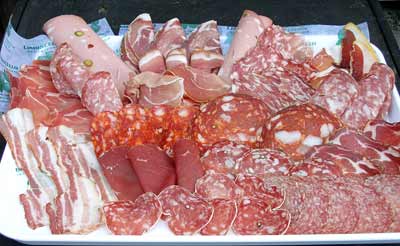A collective term for meats that are cured by salting and drying or smoking, born out of the necessity to preserve meats for eating in times of scarcity or for journeys. In fact, most of the meat consumed by the poor traditionally was preserved. Preservation of foods led to the ability of armies and navies to move, bringing large scale invasions and changing the face of the world. The more benign side was that journeys of exploration could also be made. In Italy pig meat or pork is the preferred meat for curing.
Salumi include whole joints of cured meats, such as hams, prosciutto, coppa and pancetta, and foods such as salami and sausages, made by mincing meat with flavourings such as chilli flakes, fennel and rosemary, and putting this mixture into casings. These differ enormously across the country, with different methods and flavours predominating in different regions. Salami does not need to be cooked, while sausages often do.
Salumi are generally served thinly sliced. Salumi is the Italian equivalent of charcuterie.
